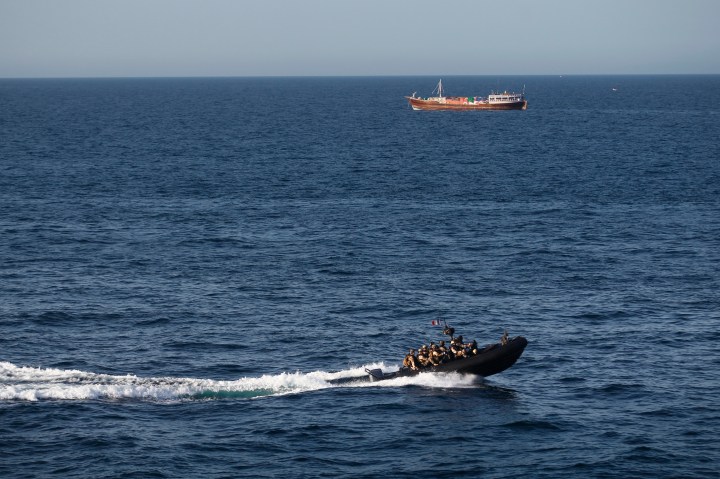ISS TODAY ANALYSIS
Holistic approach needed: Fragmented responses to maritime security sees numerous crimes slip through the cracks

A broader approach is welcome but it remains to be seen whether the interests of the shipping industry and coastal states can align.
For almost two decades, maritime security in the Western Indian Ocean was associated with fighting pirates off the coast of Somalia. These initiatives now need to be reformed as piracy has declined and other maritime crimes have increased. Illegal fishing along with smuggling and trafficking of people and illicit items such as narcotics are all on the rise.
There are also significant maritime dimensions to conflicts in the region. These affect the Yemen coastline, the Strait of Hormuz between the Persian Gulf and the Gulf of Oman, and the Mozambique Channel, making it unsafe for seafarers, states using adjacent shipping lanes and marine resource extraction.
Early on, initiatives aimed at strengthening regional navies and law enforcement recognised the need to look at problems besides piracy. These initiatives were the Djibouti Code of Conduct and the United Nations (UN) Office on Drugs and Crime’s Indian Ocean Forum on Maritime Crime.
By comparison, the response of the core political tool for coordinating international anti-piracy efforts in the region — the Contact Group on Piracy off the Coast of Somalia (CGPCS) — was sluggish. The CGPCS was established in 2009 under UN auspices to facilitate and coordinate the counter-piracy actions of states and organisations dealing with, or affected by, Somali piracy.
By 2016, piracy was declining and was unlikely to reach 2008-12 levels again. But the CGPCS struggled to decide whether it had completed its mission and should be closed down. Or if it could be transformed to tackle other maritime insecurities observed during counter-piracy patrols.
Six years later, some conclusions have at last been reached. In January, the group agreed on a broader focus and a new name — the Contact Group on Illicit Maritime Activities in the Western Indian Ocean. The proposed name is a classic diplomatic compromise allowing for several interpretations on how best to address maritime crimes that harm the marine environment. The need for close coordination with other initiatives and institutions was also highlighted — a challenge raised in several reports to the CGPCS plenary.
So what might this mean in practice? Two scenarios appear realistic.
The CGPCS has always been a consensus-driven forum, but that could become difficult as future plenaries are unlikely to discuss the issues that the shipping industry worries about most. These include the spillover from the Yemen conflict and recent grey-zone activities in the Strait of Hormuz.
Drug smuggling and illegal fishing in the Western Indian Ocean are the two most likely problems for coastal states that the group could address — but these aren’t issues the shipping industry is prioritising. That could be problematic. If the industry disengaged from this initiative, it could undermine the Contact Group’s credibility as a viable institution for enhancing maritime security.
Several organisations — such as the Combined Maritime Forces and EU Naval Force Somalia — already address drug smuggling and illicit fishing and should be invited for such meetings. The CGPCS has been the glue that has kept most of these multilateral initiatives collaborating towards shared goals.
In the case of illegal fishing, the group should include efforts to deal with environmental or economic problems that create maritime insecurity. Fisheries is a complex, fragmented and very technical field of governance in its own right. It is coordinated by, among others, the Indian Ocean Tuna Commission, the International Maritime Organization and the Food and Agriculture Organization.
So just how the refocused Contact Group can be expanded to be as comprehensive as possible without taking on too much remains open for debate. What is certain is that a concerted effort to secure widespread buy-in and legitimacy is required.
The second scenario is much more ambitious. The region has many technical forums devoted to particular issues. These include the maritime security working groups of the Indian Ocean Rim Association, the Indian Ocean Naval Symposium, the Djibouti Code of Conduct and the Indian Ocean Forum on Maritime Crime. But responses are often fragmented and would benefit from a more holistic approach. Cross-overs should be looked at, and diplomatic and political attention given to these issues.
Rather than singling out particular illicit maritime activities, the group could engage in an open diplomatic dialogue to enhance the global understanding of the region’s security problems. It could also help prepare inputs for deliberations by other bodies such as the African Union Peace and Security Council and UN Security Council.
The group could consider modelling itself on successful formats used in other regions such as the Dakar International Forum on Peace and Security in Africa, the Shangri-La Dialogue in Asia and the Munich Security Conference in Europe.
Whatever direction it chooses, the Contact Group should retain its valuable legacy as an inclusive organisation that gave a voice to states, regional and international organisations, industry players and non-governmental organisations. The group was also effective at experimenting with responses in an agile manner. The CGPCS showed that many maritime crimes and threats are transnational in scope and impact and why that makes cooperation essential for maritime security and development in the region. DM
Christian Bueger, Professor of International Relations at the University of Copenhagen and Co-Director of the SafeSeas network and Timothy Walker, Senior Researcher and Maritime Project Leader, Institute for Security Studies (ISS) Pretoria.
This article is published with support from the government of Norway.
First published by ISS Today.
[hearken id=”daily-maverick/9153″]

















 Become an Insider
Become an Insider
Comments - Please login in order to comment.